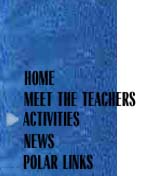
|
at the American Museum of Natural History Water Layering and Circulation Keeping Warm When it is Cold: How does a polar bear keep warm? Popcorn Neutrino Lab Ice Continent Encounter The Frozen Desert Using Triangulation to Locate Meteorites from Witnessed Falls Cold Hard Facts... What Inquiring Minds Will Know Cold Hard Facts... What Inquiring Minds Will Know: High School Version Sediment Tubes Pangaea Puzzle The TEA Program held a summer workshop devoted to creating classroom lessons that reflected the instructional impact of the polar field experience for five years starting in 1998. In 2003 the TEA Program held the Transfer Workshop at the American Museum of Natural History (AMNH). Whereas the past efforts by TEA staff to provide workshops focused on the development of new classroom materials, the Transfer meeting aimed to further the parcticipants' understanding of the role of inquiry in science education by having them rework one of their existing classroom lessons. This shift in workshop design resulted from the TEA staff realizing that while the focus on the creation of new materials did result in classroom lessons with a polar theme, it did not ultimately support the Program's goal of informing teaching practices through research experience -- "science investigations in classrooms should model the real process of science" (TEA Brochure). The Transfer Workshop's structure enabled the TEA staff to do more than provide teachers with time to write-up a lesson, it allowed them to offer a professional development experience with concrete connections to the classroom. At the Transfer Workshop parcticipants focused on how to more fully incorporate an inquiry approach into their own teaching practices. The structure of the meeting included sessions devoted to instructional practices, time to investigate classroom lessons, time for peer feedback, science talks by science researchers, and scientist-led tours of exhibit halls at AMNH. The scientists who presented at the workshop all stressed the importance of observation in their research and provided science talks on a variety of topics including the nitrogen cycle in lakes in the Antarctic dry valleys, classification and biogeographical distribution of fishes, cladistics and paleontology, and the search and classification of meteorites. This workshop and the resulting lessons would not have been possible with out the considerable effort of all the parcticipating teachers and researchers. The TEA team is especially grateful to Ms. Sally Crissman of TERC for her contributions to 2003 Transfer Workshop. More Lessons Developed by TEA Teachers |
